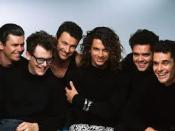 INXS is an Australian rock group. The band was formed in 1977 and comprised Michael Hutchence (lead vocals), Andrew Farriss (guitar and keyboards), Tim Farriss (lead guitar), Jon Farriss (drums), Garry Gary Beers (bass), and Kirk Pengilly (saxophone and guitar). On September 20, 2005, Canadian singer J.D. Fortune became the band's new lead vocalist after a twelve-week competition on the CBS reality show Rock Star: INXS.
INXS is an Australian rock group. The band was formed in 1977 and comprised Michael Hutchence (lead vocals), Andrew Farriss (guitar and keyboards), Tim Farriss (lead guitar), Jon Farriss (drums), Garry Gary Beers (bass), and Kirk Pengilly (saxophone and guitar). On September 20, 2005, Canadian singer J.D. Fortune became the band's new lead vocalist after a twelve-week competition on the CBS reality show Rock Star: INXS.
INXS began under the name The Farriss Brothers but the band changed their name to INXS in 1979, just prior to the release of their self-titled debut album in 1980. INXS and its follow-up, 1981's Underneath the Colours (produced by Richard Clapton) were hits in their native Australia, and their third album was released worldwide. The single "The One Thing" brought them their first top 40 hit in America, while "Don't Change" became a staple in the set list of college rock bands who played the frat circuit. With the Nick Launay-produced fourth album, The Swing in 1983, the band received significant attention in the US and UK, as the single "Original Sin" became a minor pop radio hit and the band's charismatic singer Michael Hutchence gained attention for his MTV-ready looks. The band, which had started out as a New Wave act featuring more synthesizers than guitar, gradually moved in a more straight-ahead Rock oriented direction through the first half of the 1980s. By 1985's breakthrough album Listen Like Thieves the band had perfected a matured sound influenced by The Rolling Stones and U2 but true to the band's original roots in the Aussie pubs. In the US, the first single, "This Time" stalled at #81 in late 1985, but the band roared out of nowhere with the second, "What You Need", which in early 1986 became a top five hit, bringing the band their first breakout U.S. hit.
The band's worldwide peak of popularity came with 1987's Kick, a punchy, confident set of pop-rock gems that yielded four top-ten US singles, including the number-one hit "Need You Tonight". They toured heavily behind the album throughout 1987 and 1988. Afterwards, they took a break and Hutchence released a side project of sorts called Max Q, which received decent reviews, but at best attained a cult status.
However, the band's belated attempts to follow up on the success of Kick, 1990's X and 1992's Welcome to Wherever You Are found them struggling to stay relevant as alternative rock began to dominate the airwaves and more traditional rockers like INXS fell out of favor. 1993's Full Moon, Dirty Hearts was their attempt to capitalize on the grunge movement, and while it received mixed reviews, it plunged the band further into obscurity, despite the track "Please (You Got That)" featuring the legendary Ray Charles. 1994 brought the first of many 'Greatest Hits' compilations.
Hutchence, meanwhile, remained in the public eye, dabbling in modeling and film acting and dating several models and public personalities including Kylie Minogue, Helena Christensen and Paula Yates.
Throughout the 1980s and into the 1990s, INXS was a major force in Australian popular music, leading the way into worldwide popularity for several Australian bands. The band worked closely with several other Australian artists, such as The Models and Jenny Morris, helping to establish their careers. By the mid-nineties, however, their popularity had waned, especially in the US, where their "Greatest Hits" compilation failed to reach the top 100. In 1997, the group released a comeback album titled Elegantly Wasted, which garnered mixed reviews. It fared respectably in Australia, Canada and Great Britain, but floundered in the US.
On November 22, 1997 Hutchence was found dead in his Sydney hotel room, an apparent victim of suicide (some speculate his death was actually an accident, the result of autoerotic asphyxiation). Since Hutchence's death, INXS has continued, using Terence Trent D'Arby, Suze DeMarchi and Jimmy Barnes as temporary lead singers. Jon Stevens began singing with INXS in 2000 and was officially named a member of the band in 2002. However, he left INXS in 2003, only recording a contractually-obligated song called I Get Up, released as a single (which charted in the top 100 on the Australian ARIAnet Singles Chart) in the same year, and it was used in the Rugby Union World Cup 2003 and the EA Sports Rugby 2004 video game.
http://en.wikipedia.org/wiki/Inxs